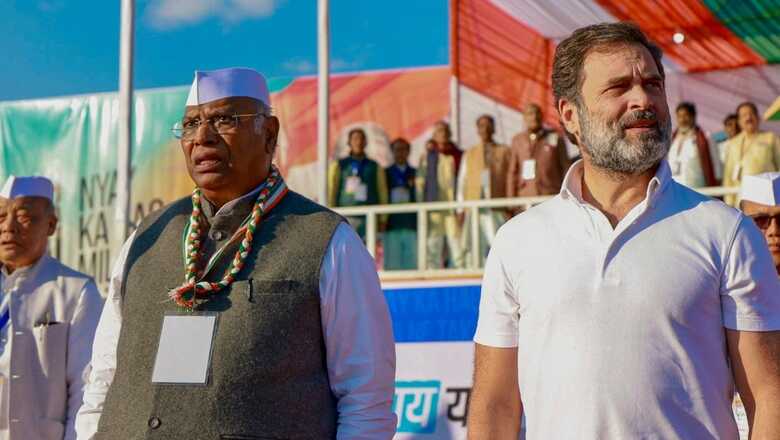Opinion | Kharge as INDIA Bloc Chief: A Progressive Decision, But Will Congress Back His Leadership?

views
Unanimously agreeing to elevate Mallikarjun Kharge to the position of chairperson of the Opposition alliance was a calculated gamble. Can his seasoned presence unite a fractious bloc and challenge the BJP behemoth, or is this merely rearranging deck chairs on a sinking ship? The answer hinges on one crucial factor: autonomy.
Other parties, while conceding Congress’ central role, are weary of the Gandhi family monopolising the limelight. The ‘Bharat Jodo Nyay Yatra’ reigniting Rahul Gandhi’s image only amplifies their anxieties. Kharge’s success, then, rests on two critical questions. First, will the Congress truly empower him as the alliance’s face, or will internal pressures clip his wings? Second, can he navigate the tightrope walk between leading the Opposition and steering a party riddled with factionalism?
If, as the chairperson of the INDIA bloc, Kharge remains a mere figurehead, his appointment will be a hollow victory. The Opposition needs a strategist, not a puppet. He must be allowed to build consensus, forge alliances, and articulate a compelling vision that transcends Congress’ internal squabbles. Equally crucial is his ability to balance both hats. Can he juggle the demands of leading a diverse alliance while keeping his own party house in order? Internal dissent within the Congress can quickly cripple the Opposition’s momentum. The upcoming months will be a litmus test. Can Kharge wield his experience and political acumen to forge a cohesive front? Or will internal power struggles and conflicting agendas thwart his efforts? The stakes are high, and the answer will reverberate through the 2024 elections.
Rahul Gandhi’s Unyielding Quest for Recognition
The initiation of the Bharat Jodo Nyay Yatra by Rahul Gandhi sends a resounding message: the political spotlight of Opposition politics should squarely rest on him. Despite the Opposition’s endorsement of Mallikarjun Kharge as the INDIA bloc chairperson, Rahul subtly redirects attention to himself within the Congress. This strategic move raises critical questions about the internal dynamics of the party and its leadership structure. By overshadowing Kharge, Rahul not only undermines his authority but also casts a shadow over the unity and coherence within the Congress.
The potential consequences of this shift in focus are significant, with the risk of internal discord and a weakened party stance in the political arena. It is imperative for the Congress leadership to promptly address these concerns, presenting a united front to effectively challenge the ruling party. The party’s success hinges on demonstrating cohesion and purpose, and the current situation demands immediate attention and resolution. While the Congress should acknowledge Opposition parties’ reservations about the Gandhi family leading the alliance, persistently pushing Rahul Gandhi as the key leader against the BJP might erode the Opposition’s strength over time. Balancing internal dynamics and projecting a united front is crucial for the Congress.
Congress’ Calculated Move to Fortify Control in Opposition
The recent manoeuvre by the Congress, pushing Mallikarjun Kharge as the Opposition alliance chairperson, is nothing but a display of political cunning that cannot be ignored. It is a calculated move, a strategic chess play aimed not at bolstering the Opposition but at fortifying the Congress’ grip on power. The choice of Kharge is not a testament to the party’s commitment to democracy or fostering collaboration; instead, it is a blatant exhibition of the Congress’ self-serving agenda. By sidestepping Rahul Gandhi, the Congress sends a message that its thirst for control supersedes any genuine effort to unite the Opposition. This decision exposes the party’s ulterior motives and its penchant for internal power plays.
The Congress’ move reveals a disturbing trend of prioritising personal interests over the greater good. It is a slap in the face of those who yearn for a united front against the ruling party. This calculated move is a disservice to the very essence of democracy and a betrayal of the people who expect the Opposition to work together for their welfare. In the grand theatre of Indian politics, the Congress’ decision stands as a testament to its Machiavellian tactics. The facade of Opposition unity crumbles, revealing a party more interested in its own survival than the well-being of the nation. The Congress’ choice of Kharge is not just a betrayal, it is a brazen declaration that power games take precedence over principled politics. This move should not be overlooked or dismissed lightly; it demands scrutiny and condemnation for what it truly is—a dagger aimed at the heart of genuine Opposition collaboration.
The Significance of Mallikarjun Kharge
Amidst the din of India’s vibrant democracy, a quiet but hopeful development has emerged: the ascent of Kharge as the potential face of the Opposition alliance. This choice carries within it the seeds of a potentially potent challenge to the ruling party and deserves closer examination. Kharge’s qualifications are undeniable. As President of the Congress party and Leader of the Opposition in the Rajya Sabha, he already embodies the authority and experience befitting a national leader. He brings to the table years of political acumen, honed in the crucible of India’s diverse political landscape.
Perhaps most crucial in today’s fractured political climate is Kharge’s reputation as a consensus-builder. Within the Congress itself, he has adeptly navigated internal factions, forging unity through dialogue and compromise. This skillset bodes well for uniting the disparate Opposition forces under a single banner, a critical feat for mounting a formidable challenge. Notably, Kharge transcends the confines of narrow partisanship. Leaders like Mamata Banerjee and Arvind Kejriwal, often critical of the Congress, have acknowledged his integrity and political acumen. This cross-party acceptance broadens the Opposition’s appeal and lends it much-needed credibility. In an era where cynicism towards politicians runs high, Kharge’s relatively clean image stands out.
Untainted by major corruption scandals, he offers a stark contrast to elements of the ruling party. This moral high ground serves as a powerful electoral tool, resonating with voters yearning for clean and ethical leadership.
Dalit Factor
In the grand chess game of Indian politics, the Opposition alliance holds a hidden pawn: Mallikarjun Kharge. His Dalit identity could be the game-changer in 2024.
Prime Minister Modi has skillfully shifted the narrative towards Ayodhya’s gilded domes, weaving a saffron tapestry of religious fervour. Against this potent brew, only a countervailing narrative can hold a candle. And what could be brighter than the collective voice of India’s Dalits, long relegated to the shadows of caste? True, forging this narrative may prove an uphill battle. History, etched in the absence of a Dalit prime minister, is a stark reminder of the road ahead. Yet, to ignore the potential is to gamble with a potent force.
Kharge, standing at the cusp of this possibility, embodies a hope bigger than himself. His ascent whispers of inclusivity, of wresting the levers of power from the privileged few. His voice, echoing the aspirations of millions, could rewrite the script of 2024, not with divisive chants but with the quiet roar of long-suppressed identity.
Is the Opposition up to the task? Can they harness the power of this hidden pawn? That remains to be seen. But one thing is certain. In this complex political landscape, the whispers of Dalit identity cannot be silenced. For within them lies the potential to reshape the narrative, not just of 2024 but of India itself.
The author, a columnist and research scholar, teaches journalism at St. Xavier’s College (autonomous), Kolkata. He tweets at @sayantan_gh. Views expressed in the above piece are personal and solely that of the author. They do not necessarily reflect News18’s views.

















Comments
0 comment